Related Research Articles
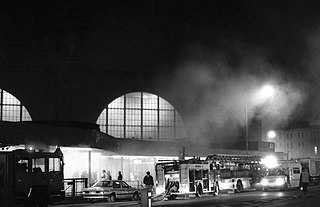
The King's Cross fire was a fire in 1987 at a London Underground station with 31 fatalities, after a fire under a wooden escalator suddenly spread into the underground ticket hall in a flashover.

The Battle of Orgreave was a violent confrontation on 18 June 1984 between pickets and officers of the South Yorkshire Police (SYP) and other police forces, including the Metropolitan Police, at a British Steel Corporation (BSC) coking plant at Orgreave, in Rotherham, South Yorkshire, England. It was a pivotal event in the 1984–1985 UK miners' strike, and one of the most violent clashes in British industrial history.

Airport security includes the techniques and methods used in an attempt to protect passengers, staff, aircraft, and airport property from malicious harm, crime, terrorism, and other threats.
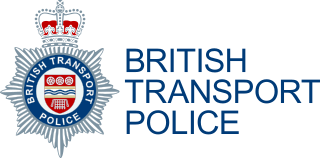
British Transport Police is a national special police force that polices the railway network of England, Wales and Scotland. The force polices more than 10,000 miles of track and more than 3,000 stations and depots.

Law enforcement in the United Kingdom is organised separately in each of the legal systems of the United Kingdom: England and Wales, Northern Ireland and Scotland. Most law enforcement is carried out by police officers serving in regional police services within one of those jurisdictions. These regional services are complemented by UK-wide agencies, such as the National Crime Agency and the national specialist units of certain territorial police forces, such as the Specialist Operations directorate of the Metropolitan Police.
Railroad police or railway police are people responsible for the protection of railroad properties, facilities, revenue, equipment, and personnel, as well as carried passengers and cargo. Railroad police may also patrol public rail transit systems. Their exact roles differs from country to country. In some countries, railroad police are no different from any other police agency, while in others they are more like security police. Some are given extensive additional authority, while those in other jurisdictions are more restricted.

Transit police are specialized police agencies employed either by a common carrier or a municipality, county, district, or state. Transit law enforcement services may also be provided by a specialized unit within a larger local law enforcement agency. Their mandate is to prevent and investigate all crime committed against the carrier or its passengers, as well as crime incidentally committed on – and sometimes around – the carrier's property.

A railfan, rail buff or train buff, railway enthusiast,railway buff or trainspotter, or ferroequinologist is a person who is recreationally interested in trains and rail transport systems.

The Civil Nuclear Constabulary (CNC) is a special police force responsible for providing law enforcement and security at any relevant nuclear site and for security of nuclear materials in transit within the United Kingdom. The force has over 1,500 police officers and support staff. Officers within the force are authorised firearms officers, due to the nature of the industry the force protects.
Counter-terrorism in Singapore is a series of detection and prevention measures to minimize the damage caused by terrorism. These measures involve the participation of all levels of society, including defence, internal security, border and infrastructure security, civil defense, and gives special focus on areas such as medical readiness and psychological preparedness.
A firearms unit is an armed unit within each territorial police force in the United Kingdom. For the most part, the police forces of the United Kingdom are unarmed; however, all have firearms units to provide the police force with the capability to deal with terrorists and armed criminals. A police officer cannot apply to join the firearms unit without first finishing their two-year probationary period, with a further two years in a core policing role for some forces. Firearms unit is the most common name outside of the capital, while that of London's Metropolitan Police Service is called the Specialist Firearms Command, Trojan or SC&O19. Within the media it is sometimes compared to the SWAT units of the United States.
In the Mass Rapid Transit system in Singapore, security issues related to crime and terrorism were not high on the agenda of the system's planners since its inception, but since the occurrence of several high-profile terrorism incidents elsewhere, CCTVs have been upgraded and installed across all stations, and security officers patrol inside the trains and within train stations 24/7.
The Special Security Team is a counter terrorism tactical unit of the Japan Coast Guard, based at the Osaka Special Security Station (大阪特殊警備基地). The acronym of its Kanji name has already been used by other units, the abbreviation "SST" is used for this team.

Transit Officers were the security and fare compliance function for RailCorp train services in New South Wales, Australia. Transit Officers conducted uniformed and plainclothes patrols on CityRail and CountryLink train services and assigned to ensure the security of passengers, staff and rail property. The position was created in 2002 after a report found that rail security required more authority than possessed by the Chubb Security security guards contracted by RailCorp. Previous figures showed that over 600 Transit Officers had been engaged, however the number was reduced to 150.

A millimeter wave scanner is a whole-body imaging device used for detecting objects concealed underneath a person’s clothing using a form of electromagnetic radiation. Typical uses for this technology include detection of items for commercial loss prevention, smuggling, and screening for weapons at government buildings and airport security checkpoints.
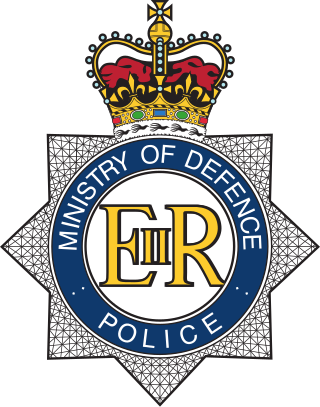
The Ministry of Defence Police (MDP) is a civilian special police force which is part of the United Kingdom's Ministry of Defence. The MDP's primary responsibilities are to provide armed security and counter terrorism services to designated high-risk areas, as well as uniformed policing and limited investigative services to Ministry of Defence property, personnel, and installations throughout the United Kingdom. The MDP are not military police and should not be confused with the Royal Military Police or any other British Service Police. Service personnel often refer to the MDP by the nickname "MOD plod".

Border Force (BF) is a law-enforcement command within the Home Office, responsible for frontline border control operations at air, sea and rail ports in the United Kingdom. The force was part of the now defunct UK Border Agency from its establishment in 2008 until Home Secretary Theresa May demerged it in March 2012 after severe criticism of the senior management.
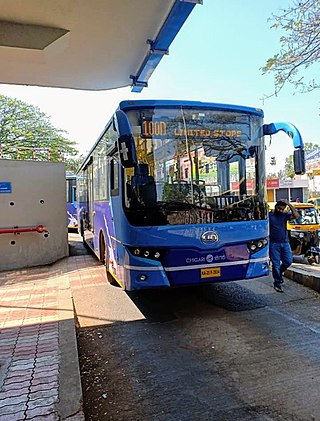
Hubali-Dharwad BRTS (HDBRTS) is a bus rapid transit system built to serve the twin cities of Hubali and Dharwad, located in the North-Western part of Karnataka state in India. Hubali-Dharwad BRTS (HDBRTS) project is a Government of Karnataka initiative to foster long-term economic growth in the region. The project promotes fast, safe, comfortable, convenient and affordable public transportation between the twin cities and aims to reduce congestion and air pollution in the region.
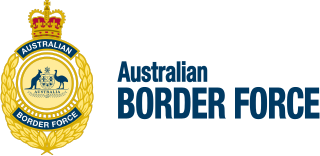
The Australian Border Force (ABF) is a federal law enforcement agency, part of the Department of Home Affairs, responsible for offshore and onshore border enforcement, investigations, compliance and detention operations in Australia. Through the ABFs Marine Unit, the ABF performs Coast Guard and marine law enforcement duties and is a component of the Maritime Border Command. The ABF is also part of the National Intelligence Community and is an active member of the World Customs Organization.

Project Servator police deployments were originally introduced by the City of London Police in February 2014 as "New policing tactics to deter and detect criminal and terrorist activity, as well as to reassure the general public. " Project Servator has since been adopted by British Transport Police, Police Scotland, Essex Police, Ministry of Defence Police the Civil Nuclear Constabulary and the Metropolitan Police. The police have used Project Servator tactics in London, on the national rail network and at the 2014 Commonwealth Games in Glasgow, V Festival and shopping centres.
References
- ↑ Committee, Great Britain: Parliament: House of Commons: Transport (25 May 2006). Personal Passenger Safety in Railway Stations: Oral and Written Evidence; Oral Evidence Taken on Wednesday 19 April 2006. The Stationery Office. pp. 47–49, 67–77. ISBN 978-0-215-02899-0.
- ↑ Sampson, Letise (2020). Getting Real with Guns and Knives: A Resource Guide for Teachers, Parents, Young People and the Wider Community’: Covering Laws, Gang Culture, Music & Social Media Influences, Prevention Strategies and Much More. NJA Publishing. p. 99. ISBN 978-1-9160667-1-7.